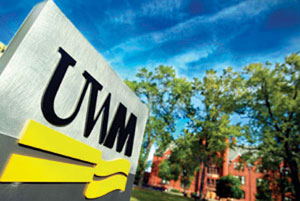Those Damn College Kids…

UWM
I’ve sat through many community meetings and a consistent thread has been “Those Damn College Kids” are ruining the East Side. From listening to this small group of residents you would think that the students on the East Side are terrible, that all they do is get drunk, fight, scream at night, and urinate on their neighbor’s yards. I’ve also heard residents claim that not only do students commit minor crimes but that they attract crime to the neighborhood. Hearing all of these problems I’ve come up with a solution.
I say move UWM out of Milwaukee. Right now UWM is looking into expanding its Engineering School out into Wauwatosa, and maybe they should consider moving the entire university. We’ll definitely be better off without all of those college students running around town, destroying property values and ruining our quality of life. Right?
Of course this idea is so terribly misguided and shortsighted that I thought nobody would suggest such an idea. Apparently I was wrong. A group of East Side residents recently held a community meeting to discuss this concept and have actually started a petition urging UWM to relocate. In response I felt it was necessary to point out a few of ways that college students help to make our city a better place.
- They Volunteer and Support Charities
- They Support Business
- They Make our City Safer
- They Help Grow our City
The truth is that many students become engaged in their community by volunteering and supporting charities. UWM students have helped to cleanup the Milwaukee River, Bradford Beach, and even our streets. Additionally UWM students, working though the Center for Volunteerism & Student Leadership at UWM, get involved with mentoring, helping the elderly winterize their homes, donating blood or choose from over ninety organizations working to improve our community. Beyond volunteering and despite their limited incomes according to the Alloy Media + Marketing’s 8th Annual College Explorer “69% of students cited “donating money to a cause or charity.” It’s clear that students are helping our community with their time and money, but rarely get credit for their efforts.
It is true that students sometimes are the victims of crime and sometimes they commit crimes themselves. But it isn’t true that singling out and eliminating students from the East Side will make it a safer neighborhood. The truth is, that college students like all residents add “eyes on the street.” The idea that having more “eyes on the street” helps to deter crimes stems from the concept that criminals don’t want to be caught so they don’t want to be seen committing a criminal act. College students play a vital role in this area by increasing the “eyes on the street” during different hours than the 9 to 5 crowd otherwise would. This mixture adds to the overall safety of the neighborhood, it certainly doesn’t take away from it.
Finally the future of Milwaukee requires growth and fundamental to this growth is a college educated populace. A recent report put out by CEO’s for Cities, titled Attracting the Young, College-Educated to Cities, indicates that “college educated young people are most likely to consider living in places similar to where they are now.” The idea that college educated people will choose to live close to where they went to school shows that to build up this talent pool will require college students going to UWM on the East Side. If Milwaukee intends to compete in the global economy, it is these very college kids that will play a key role.
I think we need to remind people, that when they say “Those Damn College Kids”, they should be reminded that “Those Damn College Kids are the Future of Milwaukee.”






















Great article, Milwaukee needs to attract more young professionals, rather than shoo them away.
I don’t think there’s any interest in or prospect for student or university removal. The reactions to student nuisances may sometimes be overstated, but this is to be expected when owner-occupancy plummets as much as it has around UWM. The fault is UWM’s; this was all foreseeable, and it was their area responsibility. Student misbehavior can also be blamed, but the only way to change that is through UWM. To some extent owner-occupants in the area can be faulted for failing to proactively organize against UWM’s foreseeable lack of responsibility and the ensuing student problems as well as the rapid exodus of many of their neighbors who sold their homes to landlords. To their credit, residents have organized now, and the pressure is on UWM where it should be.
As UWM responds to the mess they let happen, I hope their master planning will be an adequate solution. The outcomes may depend on how well UWM understands the fundamental facts about the community in terms of its human and architectural actors.
Fundamental Architectural Realities: UWM is in a residential area whose housing stock is not meant to support a high volume of renters.
Unlike the Marquette area, or at least the major portions of it, the main UWM campus lacks high density stone or concrete apartments and mixed-use buildings that do not have a lot of single-family or duplex neighbors; that do not have a lot of porches, balconies, or yard space; or that do have all-night/late-hour commercial neighbors. The UWM area feature low density housing, mostly wood duplexes and single-family homes with porches, balconies, and 2 yards. The all-night/late-hour and other commercial establishments that attract a lot of traffic (much of it on foot or bike) are not right next door to the places where the stdents live.
That environment around MU contains and restrains student activity. The environment around UWM does not.
This is why a high-volume influx of renters in the UWM area could only yield a situation that is not good for the housing stock and is unattractive to owner-occupants, high-rent tenants, and owner-occupant neighbors. This is why the shift to a high student-tenant arrangement has happened so quickly and extensively, and why there is such a negative reaction from homeowners.
Fundamental Human Realities: People all act out of their perceived economic self-interests. Until those perceptions and interests change, their behavior won’t change. These have been the most common perceptions of self-interest and the ways they have been expressed throughout the 3rd district, not just the UWM area or East Side:
* Residents who want the city to grow and prosper but don’t want new development near them.
* Residents who don’t want the city to grow and prosper or don’t care and don’t want new development near them.
* Residents who want to buy and sell drugs, or make a nuisance of themselves in other ways, and their neighbors who don’t do much to prevent and stop this.
* Residents who want fewer students in their area but sell their homes to landlords or oppose new dorm development.
* Landlords trying to do their work in short-sighted ways that exacerbate and enable nuisance activity, or are simply illegal.
* University leaders who want the university to grow and prosper but are slow, reactive, and not very bold in their efforts to take steps toward growth that are responsive to all these other views and behaviors.
* University leaders and residents who treat students as spoiled children.
* Students who see the fight the right to party as a major priority before they commence the joys of finding employment they probably won’t like and a lot of debts to pay. They feel their “right to party” is menaced by the killjoy paternalism of homeowners, university and city leaders who are soured by their own financial constraints and tiresome or unpleasant jobs.
I should also add that 3rd district university and development politics, and politics in general–local, regionally and nationally–are debased and ineffective when most people consider “politics” to be voting in the occasional election in a plebiscitary way. Every vote is a referedum on someone or some thing–a panic button to swat scapegoats. What is needed is more deliberative, informed participation that is steadily engaged and able to be proactive and accommodating of the different clashing interests that will always exist. Steady, deliberative participation by more people would also present alternatives to the politics of reactive and emotional grievances which tend to be misguided, self-defeating, and simply incoherent.
Maybe there is some hope for progress along these lines. In the past ten years many new neighborhood groups have self-organized in the 3rd district, there is more online discussion of local issues (urbanmilwaukee.com is a good example), and voting turnouts are certainly up.
GO PANTHERS!